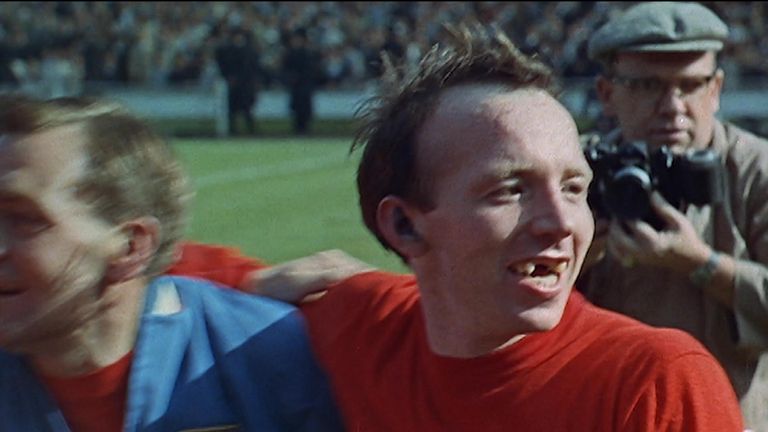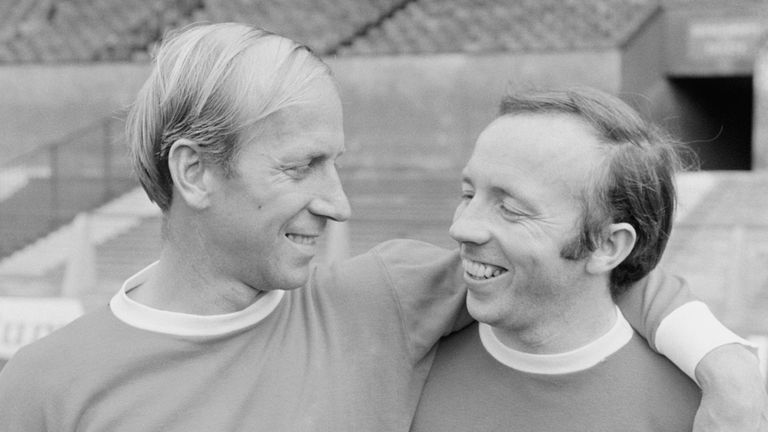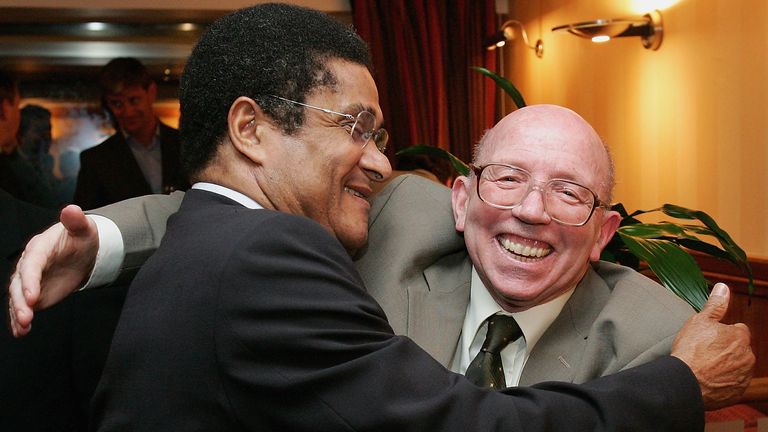Nobby Stiles: Member of England's World Cup-winning team dies aged 78
Stiles played every minute of the 1966 campaign, but sold his medals in later life to leave something for his family.
Friday 30 October 2020 21:25, UK
Nobby Stiles, a member of England's 1966 World Cup-winning team, has died aged 78.
His family said he passed away peacefully after a long illness.
Stiles played every minute of the victorious 1966 campaign, and was credited with keeping Portugal legend Eusebio quiet during the semi-final.
His post-match celebration after the Wembley final, in which England beat West Germany 4-2, saw him holding the World Cup trophy in one hand and his false teeth in the other.
Stiles was also part of the Manchester United side which became the first English club to win the European Cup two years later when they beat Benfica in the final - again at Wembley.
Domestically, the tough-tackling holding midfielder won league titles with the Red Devils in 1965 and 1967.
Another member of the 1966 England squad, Sir Geoff Hurst, said Stiles was the "heart and soul of the team", adding that he was "hugely sad" to hear of his passing.
Former England goalkeeper Peter Shilton said Stiles was a "great person who I admired very much".
Manchester United said their former player was a "titan of the club's history, cherished for his heart and personality on and off the pitch".
Stiles was born during a Second World War air raid in Collyhurst, Manchester, in May 1942, agreeing apprentice terms with United in 1959.
After he left Old Trafford in 1971, he went on to play for Middlesbrough and Preston.
Middlesbrough said Stiles - nicknamed the "Toothless Tiger" - was "one of the most colourful characters ever to wear our shirt".
He also managed Preston between 1977 and 1981, the Vancouver Whitecaps from 1981 to1984, and West Bromwich Albion between 1985 and 1986.
West Brom tweeted: "Farewell to the most famous grin in English football. Rest in peace, Nobby."
Stiles returned to United as a youth team coach under Sir Alex Ferguson in 1989.
He was diagnosed with dementia in later life, and after a mini-stroke in 2010, decided to sell his medals in order to leave something to his family.
United bought them for £200,000 and they are part of the club's museum.
Analysis by Martha Kelner, sports correspondent
The image of Nobby Stiles parading around Wembley, false teeth in one hand and the Jules Rimet trophy in the other is one of the most joyous in English football history.
The odds were stacked against Stiles making it as a footballer; born in the cellar of the family home which became an air raid shelter during World War II, he was severely short sighted and only 5ft6in tall.
But it was his tough tackling, tenacity and team spirit which saw him secure 28 caps for England and a European Cup for Manchester United.
He also coached at Old Trafford during Sir Alex Ferguson's reign, acting as a mentor to the class of 92, including David Beckham and Gary Neville.
But his family felt he had been let down by the club and the wider football family in later life. Financial struggles meant he had to sell his World Cup winner's medal and memorabilia at auction in 2010.
He also developed the first effects of dementia aged just 61, a cruel disease which robbed him of his speech towards the end.
His family want more research into the link between footballers and neurological disease. A study in 2019 found former professional footballers were 3.5 times more likely to suffer from dementia than the general population.
But Stiles' loved ones say research should have come earlier and been even wider reaching. With his death, football may be forced to examine whether it failed one of its most famous sons.





